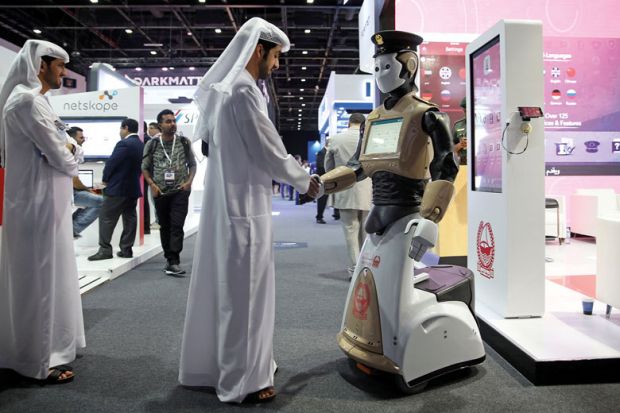The president of the world’s first graduate-level university focusing on artificial intelligence has said that its location in the Middle East has the potential to be a “unique” attraction for students.
The Mohamed bin Zayed University of Artificial Intelligence (MBZUAI), in Abu Dhabi, will offer MSc and PhD courses in machine learning, computer vision and natural language processing.
Interim president Sir Michael Brady, emeritus professor of oncological imaging at the University of Oxford, said that the aim was to attract some of the world’s brightest students to the United Arab Emirates, in the hope that they will work in the country after graduation and help it make the transition to a post-oil economy.
Sir Michael told Times Higher Education that there was “very substantial competition” for AI talent around the world and that the best postgraduates were “increasingly discriminating” about where they wanted to study.
However, he argued that the UAE could attract a share of these researchers, even when it was competing against the likes of Silicon Valley, Oxford and Cambridge. Sir Michael highlighted the strength of the research already being conducted in the UAE at the Inception Institute of Artificial Intelligence, and the opportunity to transform one of the world’s largest oil producers.
“Quite a lot of young students, I think, would be attracted by the uniqueness of contributing to the development of something new – the development of an economy which is post-oil,” Sir Michael said. “We all see the interest the kids in the West have in understanding the sustainability of the planet.
“I think the combination of the theoretical excitement with the applications is pretty unique.”
The university will welcome its first students to its Masdar City campus in September 2020. Sir Michael said that the aim was to have about 100 students in each year group – amounting to around 400-500 students in total.
A key attraction is likely to be MBZUAI’s pledge to offer all admitted students a full scholarship, plus a monthly allowance, accommodation and health insurance.
Sir Michael said that this reflected the fact that MBZUAI was trying to attract students who would otherwise have gone to well-established hubs in the West or China.
“We’ve got to get into a virtuous cycle of recruiting enough top faculty and students that do great research and great applications, that encourage more great faculty to join and so forth,” he said. “[The UAE has] a lot of catching-up to do and you have got to have incentives to build a brand.”
Sir Michael said that the detention in the UAE last year of Matthew Hedges, a British PhD researcher specialising in Middle Eastern politics, did not give him cause for concern about academic freedom. While MBZUAI would not be examining defence and security issues, Sir Michael said that he had “seen absolutely zero in the way of restrictions or restraints on what is to be studied”.
Sir Michael added that he had been reassured that educating women to work in the UAE was a priority.
“The biggest risk factor to the economic vision [of the UAE] is having sufficient excellent people who are trained not just in AI but in a range of technologies, and have a familiarity with some of the application sectors such as healthcare and financial services,” Sir Michael said.
“Creating 100 bright people a year and retaining as many as possible has got to be the basis for the economic growth which is envisaged and has already begun.”




